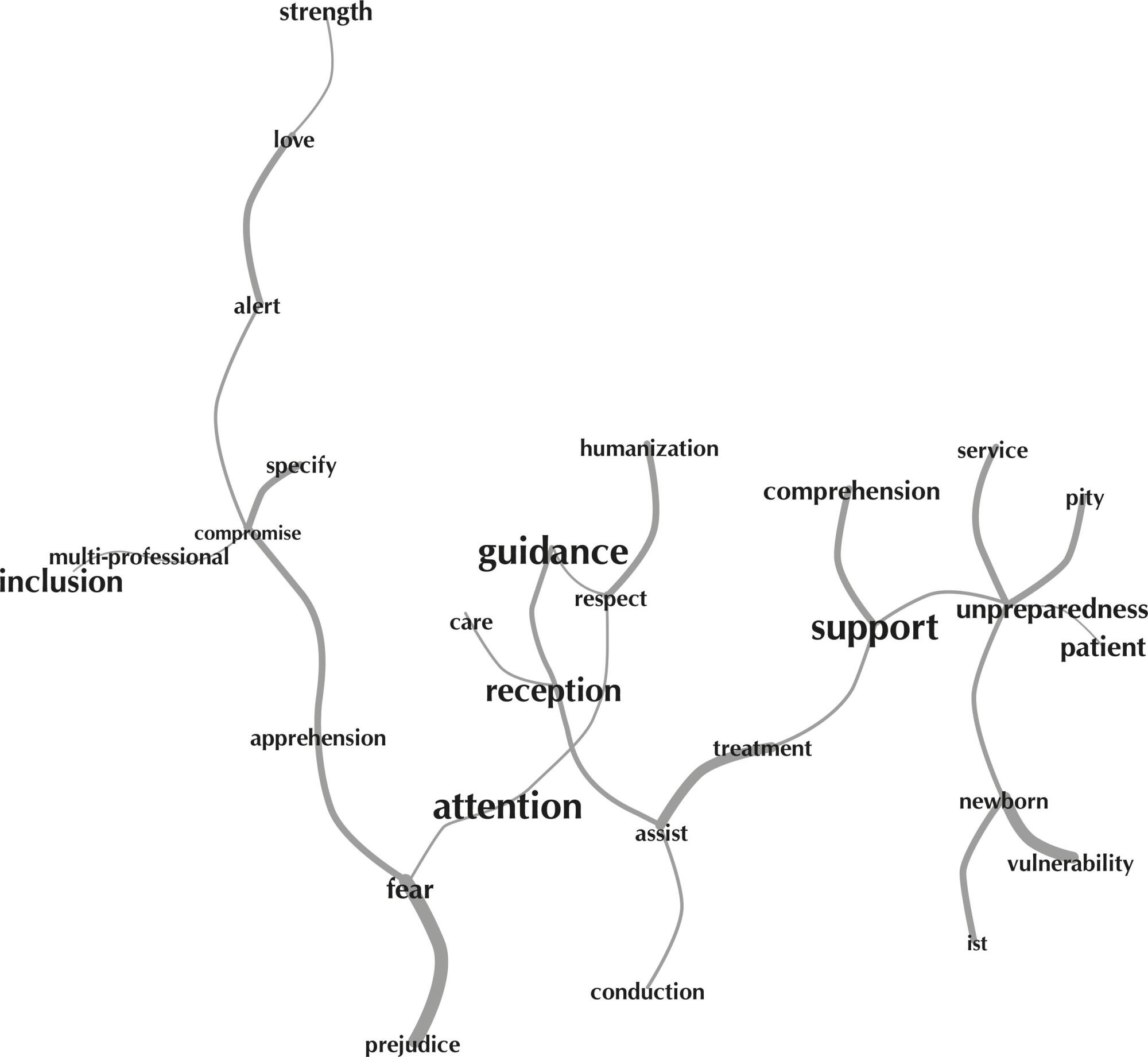-
REVIEW05-03-2024
Elements of fatherhood involved in the gestational period: a scoping review
Revista Brasileira de Enfermagem. 2024;77(1):e20230029
Abstract
REVIEWElements of fatherhood involved in the gestational period: a scoping review
Revista Brasileira de Enfermagem. 2024;77(1):e20230029
DOI 10.1590/0034-7167-2023-0029
Views0See moreABSTRACT
Objective:
To identify in the literature and summarize the elements and characteristics of fatherhood involved during pregnancy.
Method:
Scoping review that used PRISMA-ScR guide to report this review. Searches were carried out in PubMed, CINAHL, PsycInfo, LILACS and Scopus. Google search engines and public health agency websites assisted in searches of gray literature and Rayyan in screening studies.
Results:
A total of 406 articles were identified, of which 16 made up the final sample. Five elements make up an involved fatherhood: feeling like a father, being a provider and protector, being a partner and participant in pregnancy, participating in prenatal appointments and feeling prepared to take care of a baby.
Conclusion:
Fathers want to be involved in prenatal care, but feel excluded from this process. Public policies that encourage paternal involvement and healthcare professional training to better welcome and promote paternal involvement are of paramount importance.
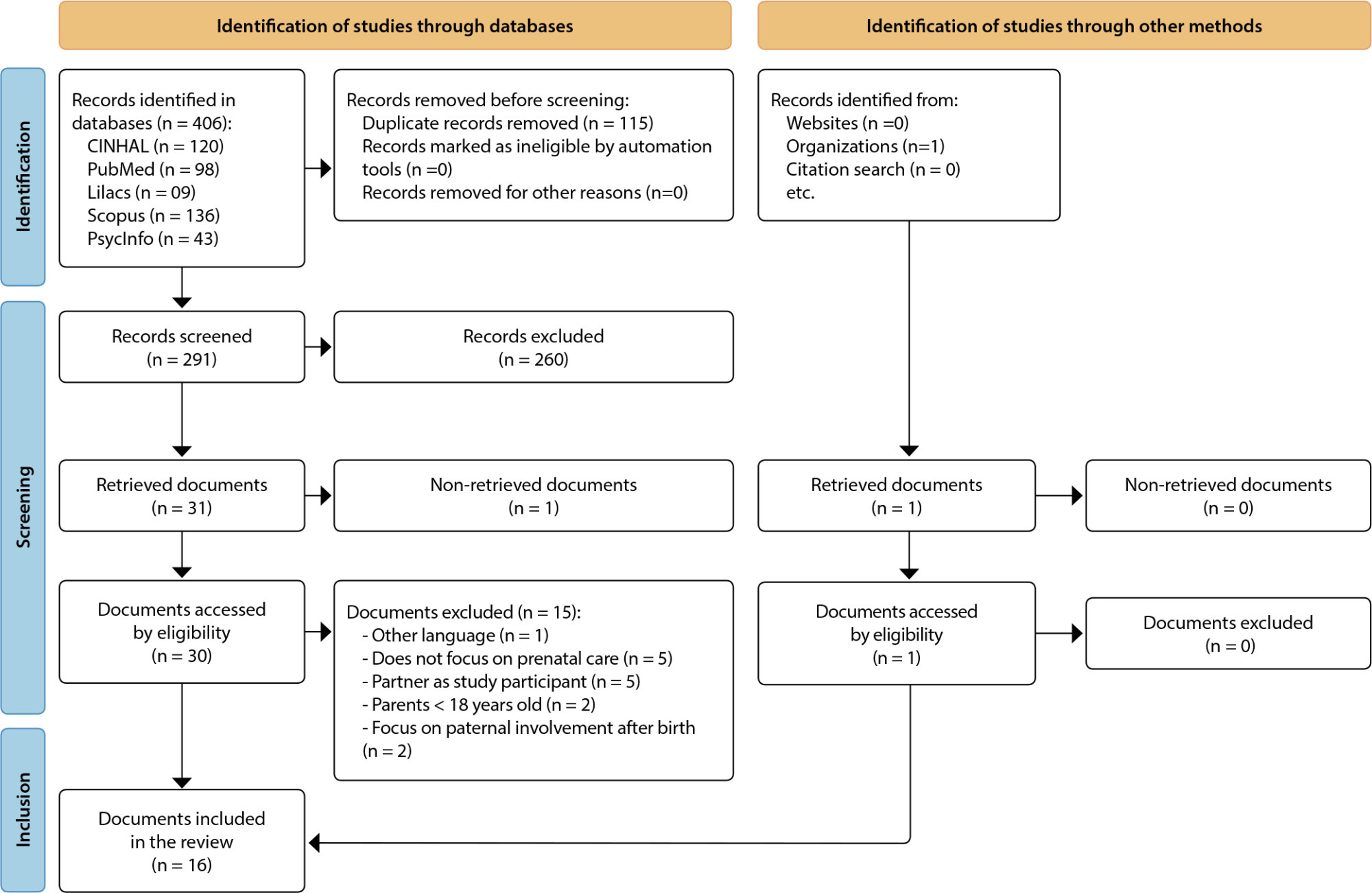
-
ORIGINAL ARTICLE05-03-2024
Preditores de volume excessivo de líquidos em pacientes em hemodiálise: estudo observacional
Revista Brasileira de Enfermagem. 2024;77(1):e20220816
Abstract
ORIGINAL ARTICLEPreditores de volume excessivo de líquidos em pacientes em hemodiálise: estudo observacional
Revista Brasileira de Enfermagem. 2024;77(1):e20220816
DOI 10.1590/0034-7167-2022-0816
Views0See moreRESUMEN
Objetivos:
evaluar los factores de riesgo del exceso de volumen de líquido en pacientes en hemodiálisis.
Métodos:
estudio retrospectivo de casos y controles. Se incluyeron 392 pacientes (196 casos y 196 controles) de dos centros de hemodiálisis. Se evaluaron datos sociodemográficos y 23 factores de riesgo de exceso de volumen de líquido mediante un formulario de recolección de datos. Los datos se analizaron mediante un modelo de regresión logística multivariado.
Resultados:
factores de riesgo conocimiento insuficiente (OR=2,06), ingesta excesiva de líquidos (OR=2,33), retirada inadecuada de líquidos durante la hemodiálisis (OR=2,62) e ingesta excesiva de sodio (OR=1,91) pueden aumentar aproximadamente dos veces la posibilidad de que se produzca un exceso de volumen de líquido en pacientes en hemodiálisis. La educación (OR=0,95) y la edad (OR=0,97) son factores protectores del volumen excesivo de líquido.
Conclusiones:
conocer estos factores de riesgo puede ayudar a las enfermeras a realizar una inferencia diagnóstica precisa y rápida del riesgo de volumen excesivo de líquidos.
-
ORIGINAL ARTICLE05-03-2024
Predictors of excess fluid volume in hemodialysis patients: an observational study
Revista Brasileira de Enfermagem. 2024;77(1):e20220816
Abstract
ORIGINAL ARTICLEPredictors of excess fluid volume in hemodialysis patients: an observational study
Revista Brasileira de Enfermagem. 2024;77(1):e20220816
DOI 10.1590/0034-7167-2022-0816
Views0See moreABSTRACT
Objectives:
to assess risk factors for excess fluid volume in hemodialysis patients.
Methods:
a retrospective case-control study was conducted. A total of 392 patients (196 cases and 196 controls) from two hemodialysis centers were included. Sociodemographic data and 23 risk factors for excess fluid volume were assessed using a data collection form. Data were analyzed using a multivariate logistic regression model.
Results:
the insufficient knowledge (OR=2.06), excessive fluid intake (OR=2.33), inadequate fluid removal during hemodialysis (OR=2.62) and excessive sodium intake (OR=1.91) risk factors may increase the chance of occurrence of excess fluid volume in hemodialysis patients by approximately two times. Education level (OR=0.95) and age (OR=0.97) are protective factors for excessive fluid volume.
Conclusions:
knowing these risk factors may help nurses with accurate and rapid diagnostic inference of the risk of excessive fluid volume.
-
ORIGINAL ARTICLE05-03-2024
What is the burden of multimorbidity and the factors associated with its occurrence in elderly Brazilians?
Revista Brasileira de Enfermagem. 2024;77(1):e20220809
Abstract
ORIGINAL ARTICLEWhat is the burden of multimorbidity and the factors associated with its occurrence in elderly Brazilians?
Revista Brasileira de Enfermagem. 2024;77(1):e20220809
DOI 10.1590/0034-7167-2022-0809
Views0See moreABSTRACT
Objective:
To estimate the prevalence of multimorbidity in elderly people and its association with sociodemographic characteristics, lifestyle, and anthropometry.
Methods:
This was a cross-sectional study using data from the National Health Survey, 2019. A total of 22,728 elderly individuals from all 27 Brazilian states were randomly selected. Poisson regression models with robust variance were employed, and a significance level of 5% was adopted.
Results:
The prevalence of multimorbidity was 51.6% (95% CI: 50.4-52.7), with the highest estimates observed in the South and Southeast. Multimorbidity was associated with being female (aPR = 1.33; 95% CI: 1.27-1.39), being 80 years old or older (aPR = 1.12; 95% CI: 1.05-1.19), having low education (aPR = 1.16; 95% CI: 1.07-1.25), past cigarette use (aPR = 1.16; 95% CI: 1.11-1.21), insufficient physical activity (aPR = 1.13; 95% CI: 1.06-1.21), and screen use for 3 hours or more per day (aPR = 1.13; 95% CI: 1.08-1.18).
Conclusion:
Multimorbidity affects more than half of the elderly population in Brazil and is associated with social, demographic, and behavioral factors.

-
ORIGINAL ARTICLE04-22-2024
Nurses’ perception of the nursing process and its relationship with leadership
Revista Brasileira de Enfermagem. 2024;77(1):e20230371
Abstract
ORIGINAL ARTICLENurses’ perception of the nursing process and its relationship with leadership
Revista Brasileira de Enfermagem. 2024;77(1):e20230371
DOI 10.1590/0034-7167-2023-0371
Views0See moreABSTRACT
Objectives:
to describe Nurses’ perception of the Nursing Process and its relationship with leadership.
Methods:
action research conducted between September/2021 and April/2022 with nurses from a medium-sized hospital in southern Brazil. The data investigated, one of the stages of the method, was collected using the Focus Group technique and submitted to Strategic Focus Analysis.
Results:
three categories emerged from the organized and analyzed data, namely: Nursing Process: a tool that qualifies nursing care; Conditions that weaken the Nursing Process; and Strategies that enhance the Systematization of Nursing Care.
Final Considerations:
the perception of the Nursing Process and its relationship with leadership are not always understood as complementary themes. Although they recognize that the Nursing Process is sometimes imposed as normative, nurses do not perceive the importance of the role of the leader, who is considered a key player in conducting and boosting the Systematization of Nursing Care.

-
ORIGINAL ARTICLE04-22-2024
Adherence to Covid-19 vaccination during the pandemic: the influence of fake news
Revista Brasileira de Enfermagem. 2024;77(1):e20230284
Abstract
ORIGINAL ARTICLEAdherence to Covid-19 vaccination during the pandemic: the influence of fake news
Revista Brasileira de Enfermagem. 2024;77(1):e20230284
DOI 10.1590/0034-7167-2023-0284
Views0See moreABSTRACT
Objectives:
to understand how fake news has influenced adherence to Covid-19 immunization, from the perspective of health professionals.
Methods:
a qualitative, descriptive-exploratory study was conducted in Campo Grande – MS. Twenty nursing professionals working in vaccine rooms or managing immunobiologicals participated through semi-structured interviews. The interviews were audio-recorded, fully transcribed, and subjected to thematic content analysis.
Results:
two categories emerged in which the professionals highlighted an increase in vaccine hesitancy among the population, influenced by fake news and denialist actions, which negatively interfered with the population’s trust in vaccines and in the professionals administering them.
Final Considerations:
concerns about vaccine safety and denialist actions by authorities and media outlets can contribute to the phenomenon of non-vaccination. The valorization of science, the promotion of educational actions, and raising public awareness about immunization were presented as strategies to increase vaccine coverage
-
ORIGINAL ARTICLE04-22-2024
Mothers’ perception of the care of newborn in the home environment
Revista Brasileira de Enfermagem. 2024;77(1):e20230080
Abstract
ORIGINAL ARTICLEMothers’ perception of the care of newborn in the home environment
Revista Brasileira de Enfermagem. 2024;77(1):e20230080
DOI 10.1590/0034-7167-2023-0080
Views0See moreABSTRACT
Objectives:
to identify mothers’ perceptions about caring for newborns in the home environment, from the perspective of complexity thinking.
Methods:
qualitative, exploratory and descriptive research, carried out between November/2022 and February/2023. Data were collected through individual interviews with 21 mothers from southern Brazil who cared for newborns at home and analyzed using the thematic analysis technique.
Results:
the four thematic axes resulting from the data analysis: Living amidst order and disorder; embracing singularities; dealing with the certain and the uncertain; support network in the (re)organizing process demonstrate that the mother caring for a newborn in their home environment experiences a distinct and plural adaptive process, which must be welcomed and understood by health professionals who work within the family environment.
Final Considerations:
the care of newborns in a home environment, in the perception of mothers, requires differentiated attention and a formal or informal support network that considers the unique specificities of each woman/mother in the personal, family and social spheres. Therefore, in addition to the social support network, it is important to rethink home intervention approaches.
-
ORIGINAL ARTICLE04-22-2024
Learning difficulties in school children: health and education professionals’ perceptions
Revista Brasileira de Enfermagem. 2024;77(1):e20230074
Abstract
ORIGINAL ARTICLELearning difficulties in school children: health and education professionals’ perceptions
Revista Brasileira de Enfermagem. 2024;77(1):e20230074
DOI 10.1590/0034-7167-2023-0074
Views0ABSTRACT
Objectives:
to understand health and education professionals’ perceptions regarding children’s learning difficulties in public schools.
Methods:
qualitative research, of the participatory action type, linked to Paulo Freire’s Research Itinerary. Forty-five professionals participated, through interviews and a Virtual Culture Circle. The analysis was developed through careful reading, reflection and interpretation of highlighted topics.
Results:
professionals discussed the (in)visibility of learning difficulties, strategies and resources in the educational sector and the search for solutions in the health sector. It was found that the production of complaints related to school learning is attributed predominantly as an individual problem of children or their family, exempting the educational institution from this process.
Final Considerations:
greater investment in professional training and development policies is urgently needed to facilitate coordination between sectors, with a view to overcoming outdated pedagogical and health models.
Keywords:Child HealthLearning DisabilitiesLow School PerformancePrimary Health CareSchool Health ServicesSee more
-
RESEARCH01-01-2017
Adherence to standard precautions in a teaching hospital
Revista Brasileira de Enfermagem. 2017;70(1):96-103
Abstract
RESEARCHAdherence to standard precautions in a teaching hospital
Revista Brasileira de Enfermagem. 2017;70(1):96-103
DOI 10.1590/0034-7167-2016-0138
Views0ABSTRACT
Objective:
analyze related factors and the level of adherence to standard precautions of nursing professionals from the clinical medical division of a teaching hospital.
Method:
a quantitative, cross-sectional, analytical study was conducted with 54 nursing professionals using the Psychometric Scale of Adherence to Standard Precautions, translated and validated to Brazilian Portuguese.
Results:
the global score of adherence was intermediate (4.41); no statistically significant correlation was observed between adherence and professional category (p=0.404) and length of professional practice (p= 0.612). A correlation was observed between ‘Washes hands after removing disposable gloves’ (p=0.026) and professionals with nursing practice above 10 years.
Conclusion:
adherence to standard precautions by the nursing team was intermediate, with no statistically significant difference in relation to the professional category and length of professional practice.
Keywords:Exposure to Biological AgentsNursing, TeamOccupational RisksPersonal Protective EquipmentUniversal PrecautionsSee more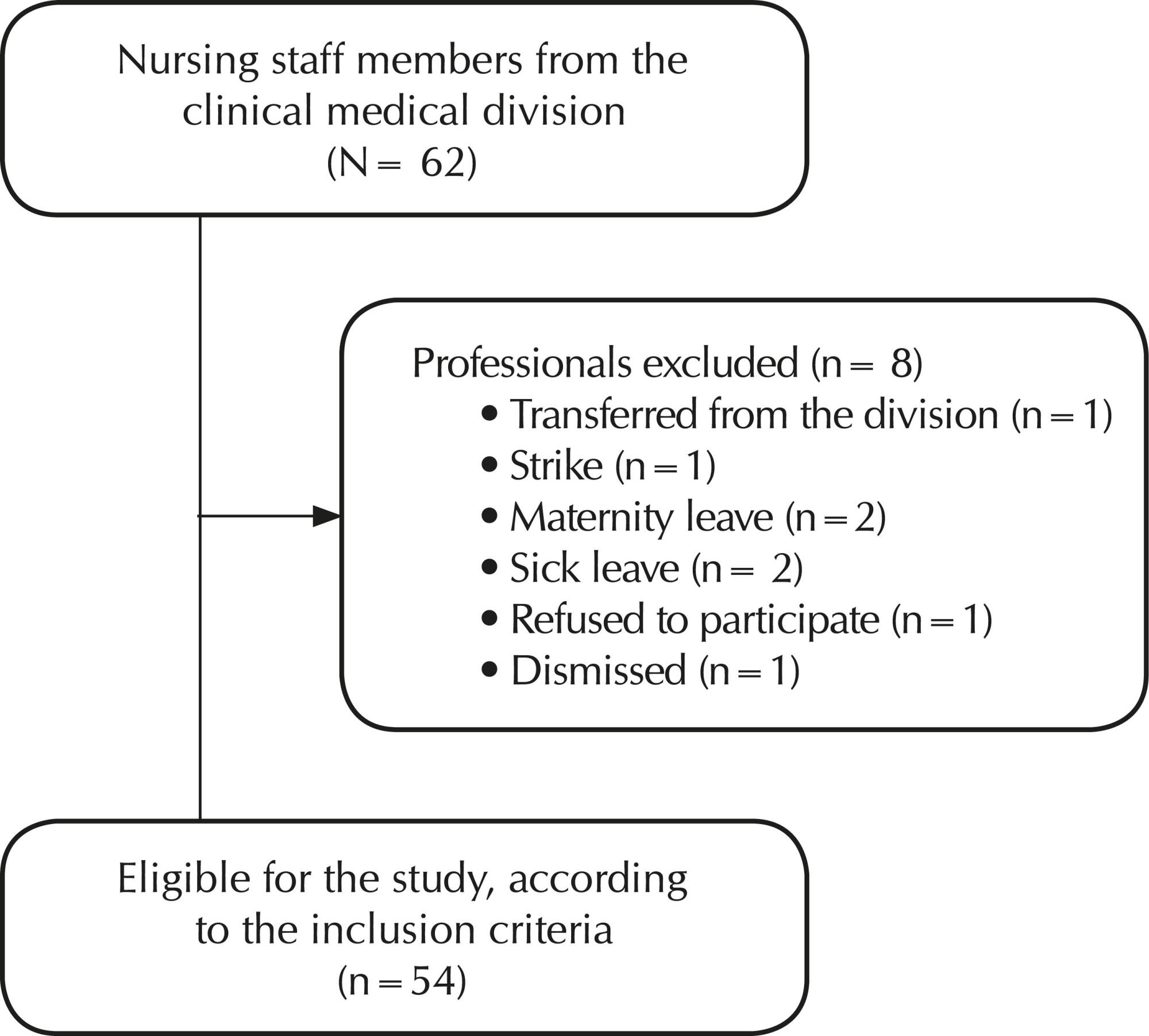
-
RESEARCH01-01-2017
Analysis of adverse events following immunization caused by immunization errors
Revista Brasileira de Enfermagem. 2017;70(1):87-95
Abstract
RESEARCHAnalysis of adverse events following immunization caused by immunization errors
Revista Brasileira de Enfermagem. 2017;70(1):87-95
DOI 10.1590/0034-7167-2016-0034
Views0See moreABSTRACT
Objective:
to analyze adverse events following immunization (AEFI) caused by immunization error in the state of Paraná, Brazil, from 2003 to 2013.
Method:
this is a descriptive, documental, retrospective, and quantitative research using secondary data from the Adverse Event Following Immunization Information System and the Immunization Program Evaluation System. We included cases confirmed and/or associated with different types of vaccines. For the analysis, we collected frequencies and incidence rates, and used simple linear regression models with Student’s t-test.
Results:
it was observed an AEFI increase due to immunization errors, especially hot subcutaneous abscesses. BCG vaccine had the highest incidence of adverse events and children under one year old were the most affected individuals.
Conclusion:
the current scenario is worrisome because these are preventable AEFI – injuring patients due to bad vaccination practices – that may undermine the population’s confidence, reducing immunization coverage, and the progress in the control of vaccine-preventable diseases.
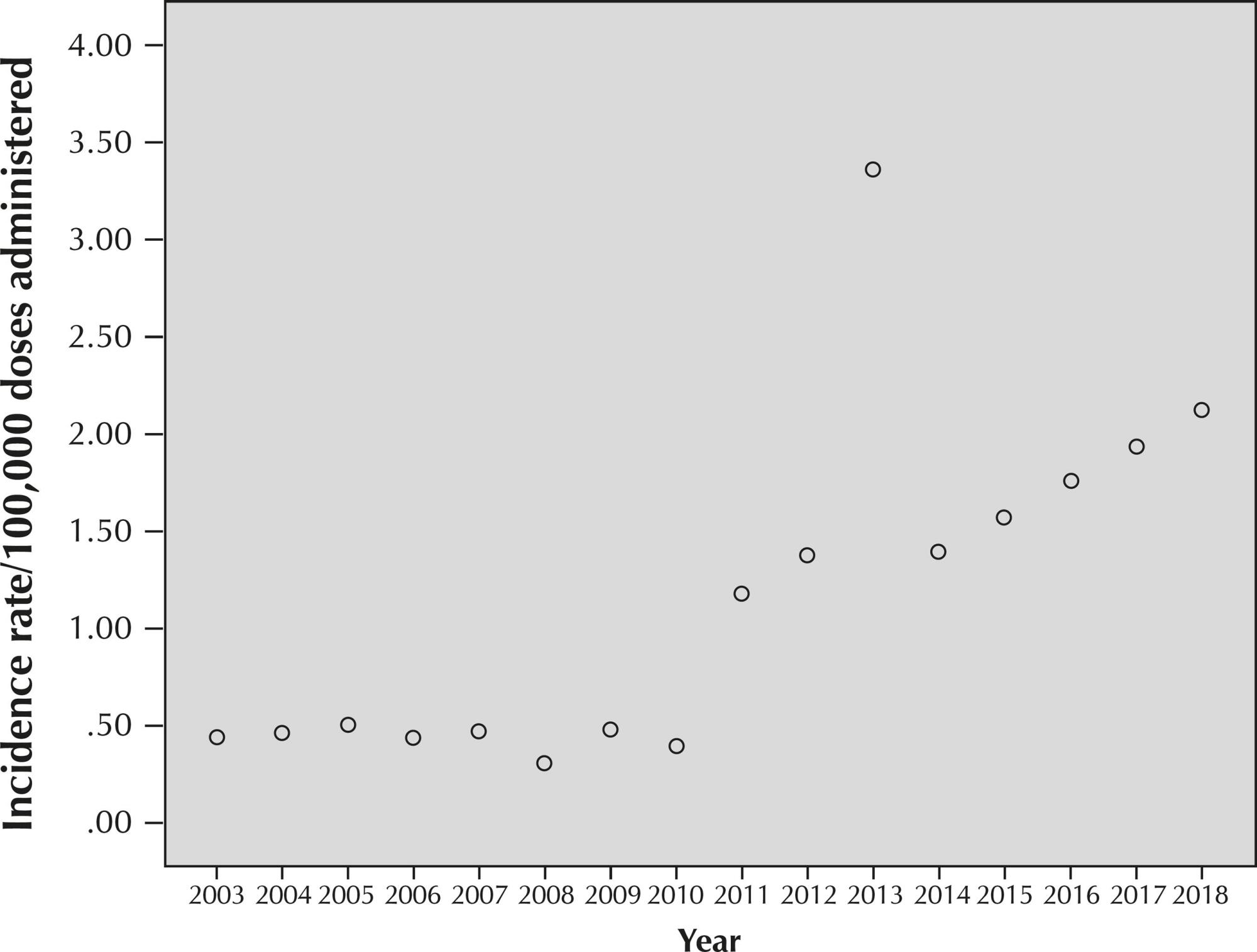
-
RESEARCH01-01-2017
Nursing practice environment and work satisfaction in critical units
Revista Brasileira de Enfermagem. 2017;70(1):79-86
Abstract
RESEARCHNursing practice environment and work satisfaction in critical units
Revista Brasileira de Enfermagem. 2017;70(1):79-86
DOI 10.1590/0034-7167-2016-0211
Views0See moreABSTRACT
Objective:
to analyze the association between the environment of nursing practices and work satisfaction in Intensive Care Units (ICU).
Method:
a cross-sectional study was performed in eight adult ICUs of a public university hospital between 2012 and 2015. The Nursing Work Index-Revised (NWI-R), in their short forms, and the Index of Work Satisfaction (IWS) were applied to investigate the environment of nursing practices and work satisfaction, respectively.
Results:
a total of 100 (34.84%) nurses and 187 (65.15%) nursing assistants/technicians participated in this study. The environment was favorable for autonomy and relationships and it showed vulnerability for control of practices and organizational support. The IWS score indicated low work satisfaction. “Environment of practices”, “length of work in the ICU” and “willingness to work” were associated with work satisfaction.
Conclusion:
to invest in the environment of practices, in factors that promote willingness to work and length of experience in the ICU increases nursing work satisfaction.
-
RESEARCH01-01-2017
Emergency interventions for air medical services trauma victims
Revista Brasileira de Enfermagem. 2017;70(1):54-60
Abstract
RESEARCHEmergency interventions for air medical services trauma victims
Revista Brasileira de Enfermagem. 2017;70(1):54-60
DOI 10.1590/0034-7167-2016-0311
Views0See moreABSTRACT
Objective:
to analyze emergency interventions for air medical services trauma victims, considering the time at the scene of trauma and the severity of the victims.
Method:
This was a descriptive, correlational and quantitative study, conducted from October of 2014 to December of 2015. Six nurses participated, completing an instrument containing emergency interventions performed in the care of victims after the occurrence of trauma. The sample consisted of 97 treatments.
Results:
Among the 97 for whom care was provided, peripheral venipuncture was performed in 97.94% of the cases; immobilization, including a backboard, was used in 89.70% of cases. The most commonly used medications were dipyrone in 44.33%, and ondansetron in 76.29%. The time on the scene showed significance with the severity of the victims. The Glasgow Coma scores were inversely related to time on the scene.
Conclusion:
Further studies are necessary, focused on care protocols for trauma victims
-
RESEARCH01-01-2017
Evaluation of the hospital accreditation program: face and content validation
Revista Brasileira de Enfermagem. 2017;70(1):47-53
Abstract
RESEARCHEvaluation of the hospital accreditation program: face and content validation
Revista Brasileira de Enfermagem. 2017;70(1):47-53
DOI 10.1590/0034-7167-2016-0184
Views0ABSTRACT
Objective:
to describe the results of face and content validation of the questionnaire entitled Quality Improvement Implementation Survey, and of two complementary scales as part of the adaptation process to the Brazilian language and culture.
Method:
included the following stages: (1) translation and synthesis of translations; (2) consideration by the expert committee; (3) back translation; (4) evaluation of verbal understanding by the target population.
Results:
the questionnaire was translated into Portuguese and its final version included 90 items. In the pre-test, the target population evaluated all items as easy to understand, with the global average of 4.58 (maximum value = 5).
Conclusion:
the questionnaire is currently translated into Portuguese and adapted to the Brazilian context. The adapted version maintained the semantic, idiomatic, conceptual and cultural equivalence, according to the assessment of the expert committee and the information provided by the target population, which confirmed the face and content validity.
Keywords:AccreditationAssurance of Health Care QualityHospital AdministrationOutcome Assessment (Health Care)Validation StudiesSee more -
RESEARCH01-01-2017
Adecuación de escalas para medir cargas de trabajo mediante metodología de calidad
Revista Brasileira de Enfermagem. 2017;70(1):39-46
Abstract
RESEARCHAdecuación de escalas para medir cargas de trabajo mediante metodología de calidad
Revista Brasileira de Enfermagem. 2017;70(1):39-46
DOI 10.1590/0034-7167-2016-0246
Views0RESUMEN
Objetivo:
Determinar cuál de las escalas evaluadas (NEMS y NAS), es más adecuada para Unidades de Cuidados Intensivos aplicando metodología de calidad.
Método:
Tras identificar como oportunidad de mejora la no adecuación de la escala NEMS para determinar cargas de trabajo de enfermería en UCI, se aplica metodología de los ciclos de mejora a dicha escala y a la NAS, como propuesta de mejora, evaluando los criterios: medición de cargas de trabajo al día y por turno, inclusión de todas las actividades enfermeras, y análisis por paciente y unidad.
Resultados:
Escala NEMS no muestra diferencias significativas en el cumplimiento (67%). Comparación NEMS-NAS, todos los criterios excepto el 1º, obtienen mejora significativa. NEMS sólo valora el criterio 1 (64,22%), y NAS todos con un cumplimiento para el 1º, 2º y 4º del 64,74%, y el 3º del 100%.
Conclusión:
La escala NAS es más adecuada para medir cargas de trabajo de enfermería en UCI.
Keywords:Carga de TrabajoControl de CalidadEnfermeríaGestión de la CalidadUnidades de Cuidados IntensivosSee more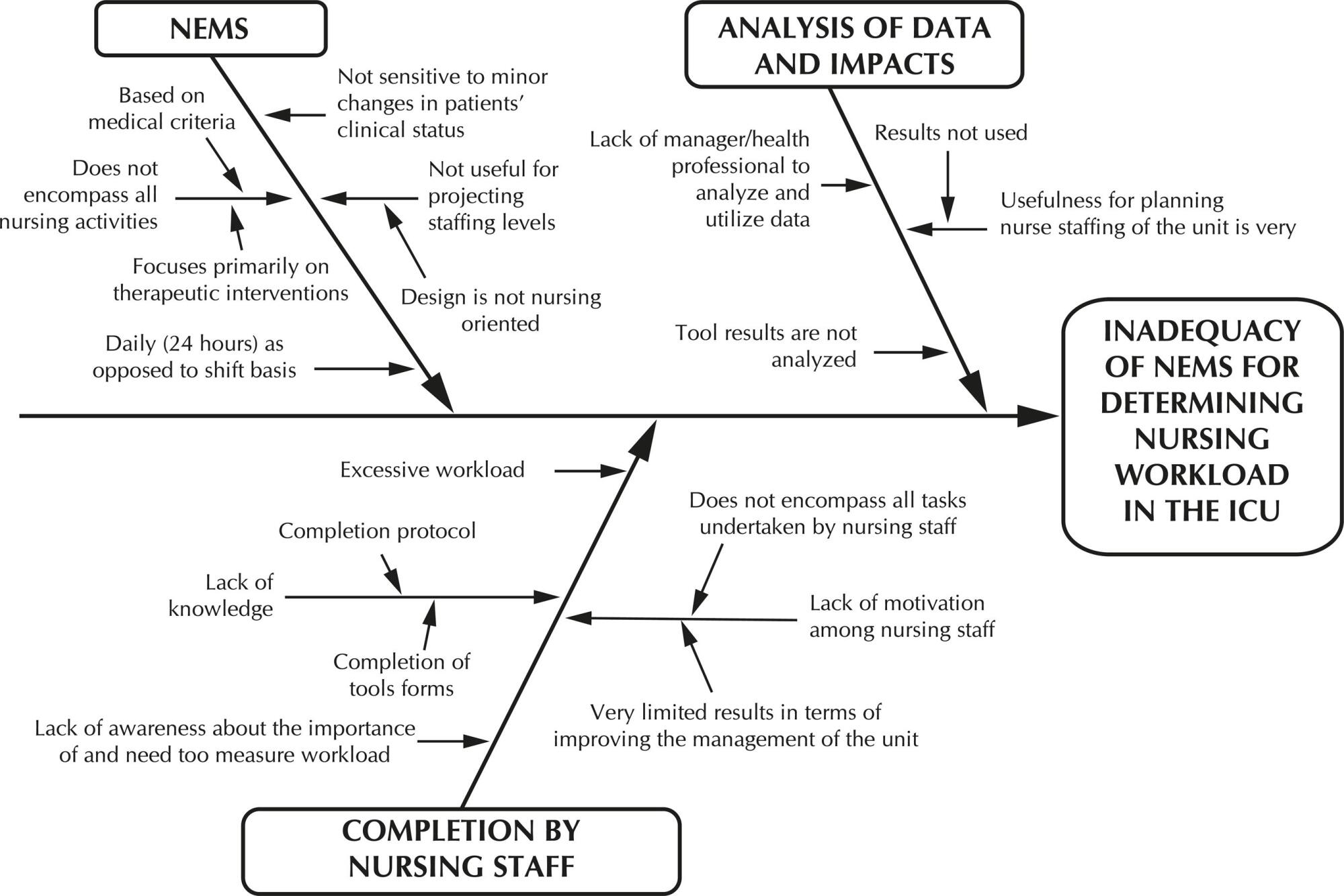
-
EDITORIAL08-19-2024
Sexual abuse, abortion and public health in Brazil: when moral judgment accentuates inequities
Revista Brasileira de Enfermagem. 2024;77:e77suppl0401
Abstract
EDITORIALSexual abuse, abortion and public health in Brazil: when moral judgment accentuates inequities
Revista Brasileira de Enfermagem. 2024;77:e77suppl0401
DOI 10.1590/0034-7167.202477suppl0401
Views0Here is an academic-political editorial that aims to call on the scientific field to reflect on the dangers of decisions regarding the right to abortion under moral rules, since there is no evidence that such a perspective translates into practices of care, protection of childhood and gender equity – elements that are so urgent and […]See more -
ORIGINAL ARTICLE08-19-2024
The use of individual tracking programs in public health: a bioethics dilemma
Revista Brasileira de Enfermagem. 2024;77:e20230041
Abstract
ORIGINAL ARTICLEThe use of individual tracking programs in public health: a bioethics dilemma
Revista Brasileira de Enfermagem. 2024;77:e20230041
DOI 10.1590/0034-7167-2023-0041
Views0See moreABSTRACT
Objective:
to understand the bioethical perspectives on mobile tracking device use.
Methods:
theoretical study based on action research, carried out with eight graduate students from a public university. A focus group was used, with a thematic content analysis methodology with a codebook structure, approved by the Research Ethics Committee.
Results:
from the analysis, there was a concern about using devices after the pandemic ended. Using or not the device, rights inherent to humans, legislation and effectiveness of methods deepen interpretations, moving participants from a personalistic conception of the topic to a vision focused on professional implications about the methods.
Final considerations:
the debate on the impact of using technological devices on health, especially those that imply restriction of rights that refer to individuals’ private life, involves a discussion of a professional nature, in addition to requirement for clear rules on the topic.
-
ORIGINAL ARTICLE08-19-2024
Bioethical issues in the family health strategy: Considerations for nursing care management
Revista Brasileira de Enfermagem. 2024;77:e20220818
Abstract
ORIGINAL ARTICLEBioethical issues in the family health strategy: Considerations for nursing care management
Revista Brasileira de Enfermagem. 2024;77:e20220818
DOI 10.1590/0034-7167-2022-0818
Views0See moreABSTRACT
Objective:
To understand the bioethical issues involved in the care management of nurses working in the Family Health Strategy.
Method:
A qualitative study was conducted through five focus groups with 36 nurses selected in the sample. Thematic content analysis was performed based on the bioethical framework, and the synthesis was presented in a conceptual map.
Results:
Bioethical issues were identified in the nursing care practice, related to both specific bioethical themes and the peculiarities of the work. Additionally, challenges and facilitators that interfere with addressing these issues were identified.
Final considerations:
Understanding the bioethical issues involved in the care management of nurses was possible with the theoretical support of different bioethical perspectives. The identified issues relate to persistent and current themes in the field of bioethics. However, some aspects intrinsic to daily practice are still imperceptible to professionals, contributing to the difficulty of discussing bioethics in this care model.

-
REVIEW07-29-2024
Telenursing in the postoperative period: a scoping review
Revista Brasileira de Enfermagem. 2024;77(3):e20240066
Abstract
REVIEWTelenursing in the postoperative period: a scoping review
Revista Brasileira de Enfermagem. 2024;77(3):e20240066
DOI 10.1590/0034-7167-2024-0066
Views0See moreABSTRACT
Objectives:
to map available evidence on telenursing use in the postoperative period and its impact on patient outcomes.
Methods:
a scoping review, conducted according to the JBI model and the PRISMA-ScR checklist. The search was carried out in the CINAHL, Embase, LILACS, PubMed, Web of Science, SciELO, Scopus and Cochrane Library databases.
Results:
twelve studies were included, published between 2011 and 2023, 66.6% of which were in developed countries. Of the positive outcomes, we highlight improved levels of disability, autonomy and quality of life, lower rates of post-operative complications, pain and reduced costs. Telephone monitoring was the most widely used modality, but there were few studies in the pediatric context and in Brazil.
Conclusions:
of the studies, 11 (91.6%) identified at least one positive outcome in telenursing use and none showed negative aspects in the postoperative period. The role of nurses in digital health needs further study.

-
ORIGINAL ARTICLE07-29-2024
Men’s perception of paternal parenthood and the promotion of child development
Revista Brasileira de Enfermagem. 2024;77(3):e20230514
Abstract
ORIGINAL ARTICLEMen’s perception of paternal parenthood and the promotion of child development
Revista Brasileira de Enfermagem. 2024;77(3):e20230514
DOI 10.1590/0034-7167-2023-0514
Views0See moreABSTRACT
Objectives:
to comprehend men’s perception of paternal parenthood while caring for infants to promote child development.
Methods:
this qualitative study adopts an exploratory approach and was conducted with undergraduate and graduate students, faculty, and staff who are fathers of infants up to 6 months old from a higher education institution, excluding fathers from mononuclear families. Data collection occurred through semi-structured interviews and was analyzed using thematic categorical analysis.
Results:
fifteen men participated in the study. From the analysis, two empirical categories emerged: “Perception of being a father: challenges and novelties” and “Promotion of child development: actions carried out by fathers”. Fathers revealed feeling unprepared, the need for emotional support, and recognized activities aimed at their children’s development.
Final Considerations:
the relevance of the paternal figure for child development is highlighted, as well as the need for public policies to encourage paternal parenthood.
-
ORIGINAL ARTICLE07-29-2024
Contribution of informal caregivers to self-care in individuals with heart failure
Revista Brasileira de Enfermagem. 2024;77(3):e20230492
Abstract
ORIGINAL ARTICLEContribution of informal caregivers to self-care in individuals with heart failure
Revista Brasileira de Enfermagem. 2024;77(3):e20230492
DOI 10.1590/0034-7167-2023-0492
Views0See moreABSTRACT
Objectives:
to evaluate the contribution of informal caregivers to the self-care of individuals with heart failure.
Methods:
a cross-sectional study was conducted with 87 caregivers from March to October 2022 in the city of João Pessoa/PB. The caregivers’ contribution was assessed using the Caregiver Contribution to Self-Care of Heart Failure Index instrument. Scores ≥ 70 points indicate adequate contribution. Data were analyzed using descriptive statistics and Spearman’s correlation.
Results:
the sample consisted of 81.6% female caregivers. Median scores obtained for the self-care contribution scales were: 63.3 for maintenance; 55.5 for management; and 66.6 for confidence. Caregivers never or rarely recommended monitoring body weight, regular physical exercise, extra use of diuretics, and fluid restriction.
Conclusions:
informal caregivers showed inadequate contribution in the areas of maintenance, management, and confidence in self-care of individuals with heart failure.
-
Reflections on theoretical framework use in nursing research
Revista Brasileira de Enfermagem. 2024;77(3):e20230486
Abstract
Reflections on theoretical framework use in nursing research
Revista Brasileira de Enfermagem. 2024;77(3):e20230486
DOI 10.1590/0034-7167-2024-0486
Views0See moreABSTRACT
Objectives:
to reflect on theoretical framework use in nursing research.
Methods:
a theoretical-reflexive study, based on concepts and constructs pertinent to using nursing theories and other sciences, considering issues of epistemology or philosophy of science.
Results:
we presented what it is and why to do nursing research and what a theoretical framework is and why to use it, in addition to some considerations regarding theoretical framework use in nursing research, essential for constructing disciplinary knowledge, which enables the materialization of researchers’ work and the presentation of propositions resulting from investigations in and for nursing as a discipline and science.
Final Considerations:
based on a reflection based on epistemological conceptions, it is possible to affirm that a theoretical framework is the core of researchers’ thinking, delimiting a problem to be investigated and, based on it, outlining methodological strategies to be followed, supporting nursing action and thinking as discipline and science.

-
REVIEW07-29-2024
Nursing diagnoses for people hospitalized with heart failure: an integrative review
Revista Brasileira de Enfermagem. 2024;77(3):e20230471
Abstract
REVIEWNursing diagnoses for people hospitalized with heart failure: an integrative review
Revista Brasileira de Enfermagem. 2024;77(3):e20230471
DOI 10.1590/0034-7167-2023-0471
Views0See moreABSTRACT
Objectives:
to identify in the literature the main nursing diagnoses according to the NANDA-I diagnostic classification for people hospitalized with heart failure.
Methods:
an integrative literature review, carried out in February 2019 and updated in July 2023, in the MEDLINE via PubMed, LILACS, SciELO and CINAHL databases. Given the use of acronym PEO, studies without a time cut in Portuguese, English and Spanish were included. Descriptive analysis was carried out to present the identified information.
Results:
analysis of 27 articles identified 24 nursing diagnoses, with emphasis on Decreased Cardiac Output, Excessive Fluid Volume, Decreased Activity Tolerance and Fatigue.
Final Considerations:
evidence can contribute to better diagnostic decisions centered on people with heart failure in search of more assertive health results and have the potential to support future studies on a possible syndromic pattern in this population.

Search
Search in:
Nuvem de Tags
Aged (144) Atenção Primária à Saúde (239) COVID-19 (104) Cuidados de Enfermagem (269) Educação em Enfermagem (151) Educação em Saúde (139) Enfermagem (930) Estudos de Validação (131) Health Education (144) Idoso (208) Mental Health (149) Nursing (987) Nursing Care (306) Patient Safety (151) Primary Health Care (284) Qualidade de Vida (104) Quality of Life (106) Saúde Mental (145) Segurança do Paciente (150) Validation Studies (108)




